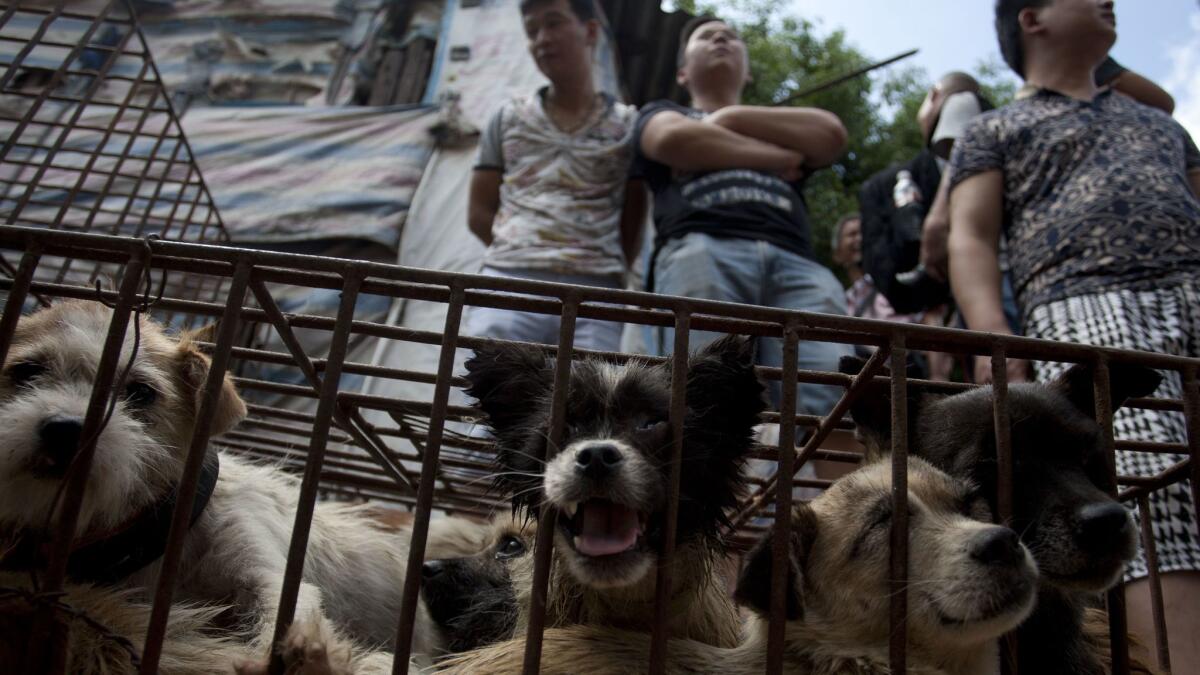In a victory for animal rights activists — and dogs — China will ban dog meat sales at festival

- Share via
Reporting from BEIJING — Chinese authorities have banned dog meat sales at the country’s notorious Yulin dog-eating festival, two U.S. nonprofit organizations reported Wednesday.
The annual festival in Yulin — a prefecture-level city in southwest China’s Guangxi province — has in recent years emerged as a lightning rod for animal rights activism, granting the sleepy city a degree of global infamy. Activists say thousands of dogs — some of them abducted pets — are slaughtered at the festival each year; they’re served alongside lychees and grain alcohol to mark the summer solstice.
The Yulin government has banned the city’s dog meat vendors from selling the meat for one week starting June 15, the U.S.-based Duo Duo Animal Welfare Project and Humane Society International (HSI) said in a joint statement, citing unidentified local contacts. The 10-day festival is slated to begin on June 21.
“Even if this is a temporary ban, we hope this will have a domino effect, leading to the collapse of the dog meat trade,” Andrea Gung, executive director of the Duo Duo Animal Welfare Project, said in the statement. “I have visited Yulin many times in the last two years. This ban is consistent with my experience that Yulin and the rest of the country are changing for the better.”
The organizations attributed the change to Yulin’s new Communist Party secretary, Mo Gongming, who reportedly wants to improve Yulin’s national and international image. Penalties, they said, include a fine of up to $14,500 and jail time.
The report could not be independently verified. A man who answered the phone at the Yulin municipal government, has never openly supported the festival, denied that it even existed. “There’s never been a dog meat festival in Yulin,” said the man, who only gave his surname, Luo. (The festival’s existence is well-documented).
People in parts of southern and northeastern China have prized dog meat for centuries, considering it a delicacy with “heating qualities” that make it comforting on cool days.
Yet, as China becomes wealthier — and more exposed to foreign ideas — its attitudes toward dogs are shifting. Dogs have become popular pets among the country’s burgeoning middle and upper classes; in major cities, it’s common to see poodles, Pekingese, golden retrievers and huskies bouncing through public parks, some dressed by their owners in doggie clothing.
It is embarrassing to us that the world wrongly believes that the brutally cruel Yulin festival is part of Chinese culture. It isn’t.
— Qin Xiaona, director of the Capital Animal Welfare Assn. charity, a Chinese animal welfare group
Peter Li, a China policy specialist at HSI, said that the festival’s dog meat sales have dropped each year since 2014, but will probably continue despite the ban.
“It won’t be public resistance — like, ‘you don’t want us to sell, but we still will’ — but they’ll probably do it secretly,” he said. “They’ll probably sell it at night, or they’ll supply dog meat to restaurants. They just won’t sell it at the market.”
He added that the organization received “oral notice” of the ban from local dog meat traders, as well as three visitors to a local market. He had not seen documentation of the ban.
Most Chinese people desire an end to the controversial festival, China’s official New China News Agency reported in June 2016, citing a survey.
“It is embarrassing to us that the world wrongly believes that the brutally cruel Yulin festival is part of Chinese culture,” Qin Xiaona, director of the Capital Animal Welfare Association charity, a Chinese animal welfare group, told the agency. “It isn’t.”
But the Yulin government is reluctant to completely shut the festival down, said an employee of a Chinese animal rights group that has been communicating with local officials for years — they consider it a proud local tradition. The employee requested anonymity as her organization, like many activist groups in China, is under close scrutiny from national authorities.
Although the officials have no problem considering cats and dogs as sustenance, she added, some still oppose the festival, as its mass, public slaughter of dogs violates food safety regulations.
Hollywood celebrities including Matt Damon, Joaquin Phoenix and Rooney Mara have pleaded for China to ban the festival. Last year, several animal rights groups, including Duo Duo and HSI, amassed 11 million signatures on a petition calling for its cancellation. Carrie Fisher, the late actress of Star Wars fame, helped deliver it to China’s embassy in London.
“These poor dogs need us to fight for them,” she said at the time, accompanied by her beloved French bulldog, Gary. “Every single one of them is as precious as my dear Gary, every one of them is someone’s best friend.”
Nicole Liu in the Times’ Beijing bureau contributed to this report
For more news from Asia, follow @JRKaiman on Twitter
More to Read
Sign up for Essential California
The most important California stories and recommendations in your inbox every morning.
You may occasionally receive promotional content from the Los Angeles Times.










